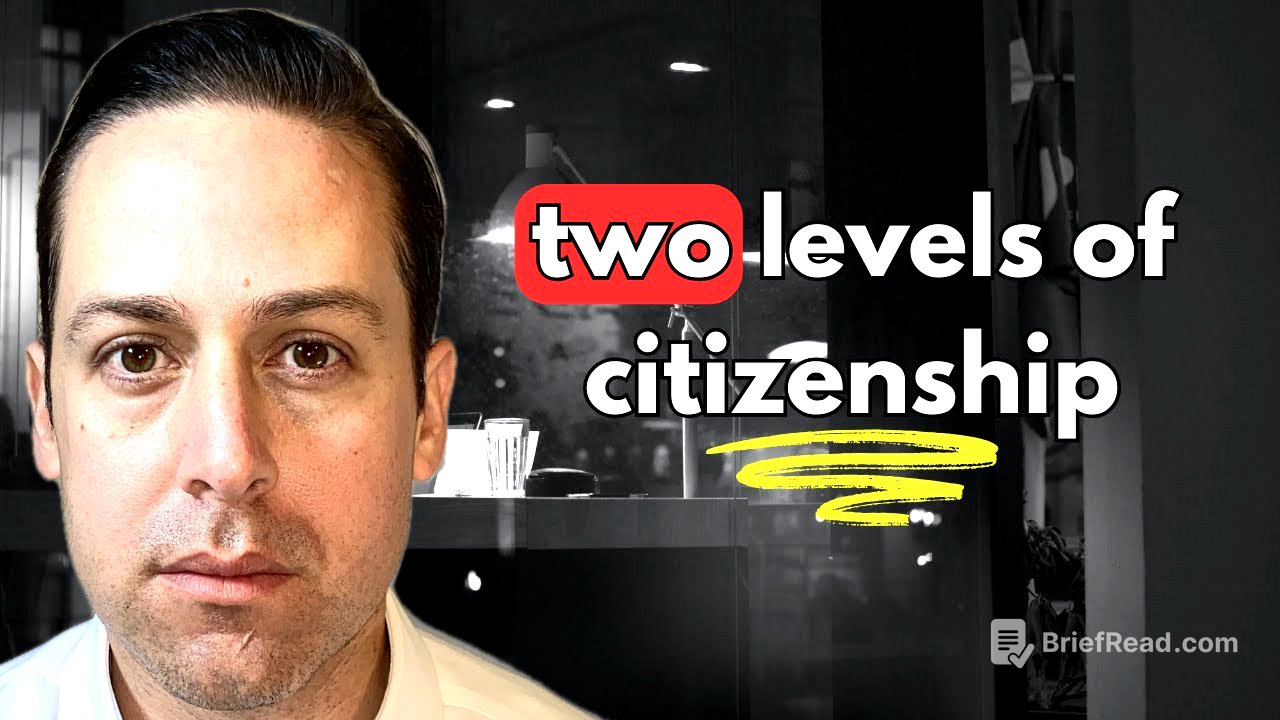TLDR;
The video discusses the Department of Justice's renewed focus on denaturalization, the process of revoking citizenship from naturalized Americans. It highlights the potential impact on naturalized citizens, the historical context of denaturalization, and the legal and ethical concerns surrounding its use. The video also touches on the rights of naturalized citizens and what steps to take if targeted for denaturalization. Additionally, it briefly mentions the actual unemployment rate.
- The DOJ is prioritizing denaturalization proceedings, raising concerns about potential targeting of naturalized citizens.
- Denaturalization is not new, but its increased use under the Trump administration is alarming to some.
- The process relies on civil litigation, which doesn't guarantee legal representation for the accused.
- Critics argue that denaturalization creates a second class of citizenship and violates due process.
- Supporters argue it protects the integrity of the naturalization process and national security.
- The video advises those targeted for denaturalization to seek legal counsel and gather evidence of good character.
Introduction to Denaturalization [0:00]
The video begins by addressing the alarming possibility of US citizens losing their citizenship despite completing the naturalization process and the number of years they have lived in the country, even if they served in the military. This is due to a memo issued by the Department of Justice (DOJ) regarding denaturalization, which is the process of revoking the citizenship of naturalized Americans, those not born on American soil but who became citizens through naturalization. The speaker emphasizes that this is distinct from deporting illegal immigrants, as it involves stripping US citizens of their citizenship.
Historical Context and Current Approach [0:21]
Assistant Attorney General Brett Schemate's directive to prioritize and maximally pursue denaturalization proceedings is discussed. Denaturalization is not a new phenomenon; it was prevalent during the Great Red Scare of the 1940s and 1950s, with approximately 22,000 people being denaturalized annually due to alleged ties to the Communist Party or affiliation with left-wing political movements. A 1967 Supreme Court ruling reduced the number of denaturalization cases, but the Trump administration is now expanding the scope of denaturalization using civil litigation, which does not guarantee legal representation for the accused and has a lower burden of proof compared to criminal proceedings.
Legal and Ethical Concerns [2:13]
A university law professor argues that using civil litigation for denaturalization violates due process and the 14th Amendment, creating a second class of US citizens who are always at risk of losing their citizenship. Conversely, organizations like the Heritage Foundation support denaturalization, arguing that individuals are not entitled to government-funded lawyers and that denaturalization protects against criminals, terrorists, and predators. The case of a man named Duke, who exchanged child sexual abuse material and allegedly lied on his citizenship application, is cited as an example.
Potential Targets and Scope of Denaturalization [4:27]
The DOJ's memo grants US attorneys broad discretion in choosing targets, including those involved in national security violations, fraud against the government, and any other cases deemed sufficiently important, raising concerns about potential abuse of power. With approximately 25 million naturalized Americans, or one in 13 people, potentially at risk, the vague language in the DOJ's criteria is particularly concerning. Hypothetical scenarios, such as losing citizenship for social media posts or political views, are raised as potential future concerns.
Family Implications and Future Plans [5:53]
The video addresses the potential impact on the families of those who lose their citizenship, particularly concerning birthright citizenship guaranteed by the 14th Amendment, which the administration seeks to challenge for children born to undocumented immigrants or parents who obtained citizenship fraudulently. The Trump administration is also building a national citizenship database to track all naturalized citizens, potentially leading to a redefinition of American citizenship. Critics warn that this is a slippery slope, where citizenship can be continuously opened up for some and not for others.
Arguments in Support of Denaturalization [7:09]
The video presents the perspective of those who support denaturalization, emphasizing that it protects the integrity of the naturalization process, targets serious criminals, deters immigration fraud, and boosts political messaging. Lying on citizenship applications should result in voiding the application, similar to other application processes like college admissions or security clearances. The focus is on the vague, catch-all statement in the DOJ's criteria, with concerns about people being unfairly targeted.
Steps to Take if Targeted and Unemployment Rate [8:21]
The video advises individuals unfairly targeted for denaturalization to immediately seek an immigration attorney, understand the grounds for denaturalization, collect evidence of good character, and track all correspondence. Denaturalization does not immediately lead to deportation, and there are ways to fight back and win in some situations. The video concludes by briefly mentioning that the actual unemployment rate is around 24%, considering functional unemployment.









